Zhou Enlai/Daisaku Ikeda
World Youth Civilization Symposium
December 6, 2014
Nankai University, Tianjin China
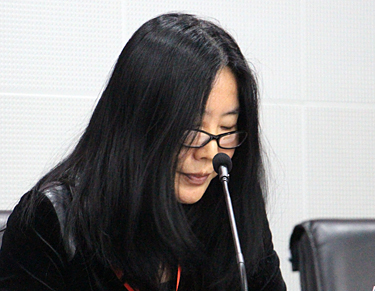
by Xiaofang Zhou
President and co-founder, Zhou Enlai Peace Institute
Dear leaders of Nankai University, Mr. Ji Yaguang, distinguished teachers and friends:
Hello, and good morning to all!
I am honored to participate in this important Symposium.
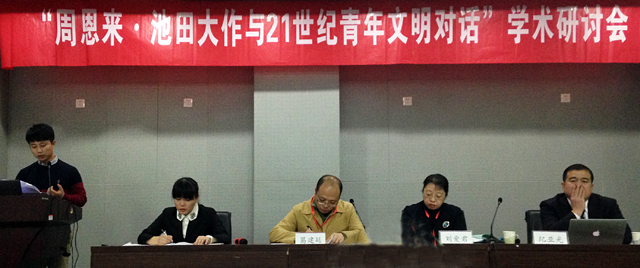
Opening student speaker at the World Youth Symposium.
In August of this year, we at the Zhou Enlai Peace Institute were privileged to host a distinguished delegation from China in Los Angeles. Together, we attended the grand “35th Anniversary of the Establishment of Diplomatic Relations with China,” where we welcomed Ji Yaguang and the Zhou Enlai Life Research Association, led by Mme Liao Xinwen. Later, we all visited the University of Hawaii East-West Center, China Research Center, and the Confucius Institute in Honolulu with other leaders, and had a friendly discussion.
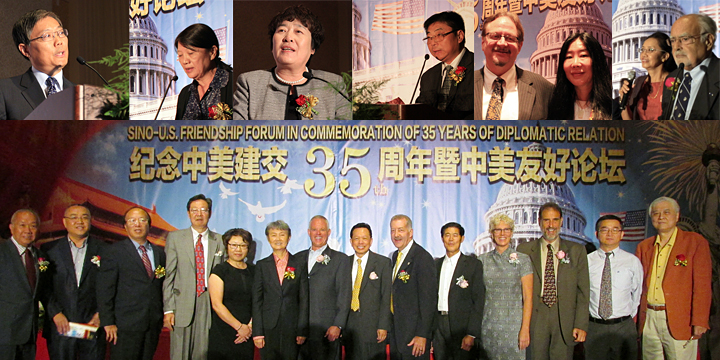
Pasadena, California: speakers at the 3th Anniversary of Diplomatic Relations included Chinese Ambassador Liu Jian, CCCPC member Liao Xinwen, Wang Xukui from the Huaian Memorial, Ji Yaguang from Nankai University, Michael North and Xiaofang Zhou; financier Arthur Lipper; speaker of the House of Hawaii Calvin Say, former Mayor of Honolulu Peter Carlisle; Professor Katherine Li from University of Hawaii; and attorney Roger Epstein.
Today, I am grateful to accept Mr. Ji’s return invitation to visit Nankai, to take part in this meeting today and exchange ideas. I am really pleased, and on behalf of all the staff, Mr. Michael North and the Research Institute, to express to you my heartfelt thanks!
I come here from beautiful Hawaii. Aloha!

Officials from China, who direct key research offices about Zhou Enlai, meet with officials from the University of Hawaii, Honolulu.
This expression means: breathe together, in peace and brotherhood. I look forward to these two short days, to be able to share with you the universal spirit of peace and brotherhood.
Over the past three years, we have had the privilege of working with many educators, academics, government and business people, as well as with world peace organizations, to establish a specialized international research and educational institute. Our purpose is to understand the great spirit of the late Premier, Zhou Enlai. The Zhou Enlai Peace Institute actively publishes a website, exhibitions, books, films, and sponsors special public speaking events, the celebration of anniversaries, international student exchange and other projects.
Our objective is to help more people in the world to understand the great nation of China, its leader and peacemaker Zhou Enlai, and his amazing life. Let people taste his wisdom, understand his great charisma and his love of the people of the world; let them recognize the importance of his role in world history. He represents the image of China and world peace, and together with Mahatma Gandhi, Martin Luther King and Nelson Mandela, he stands among the greatest contemporary leaders of world peace.
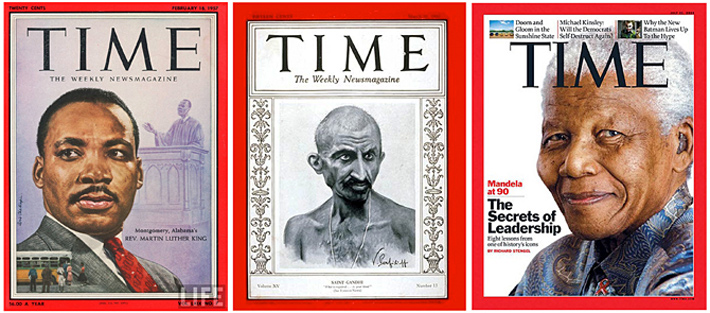
Today, in the same spirit, we also honor Dr. Daisaku Ikeda, for his great contribution to the cause of world peace.
In our work, we took great care to closely consult with the greatest experts in China — Central Literature expert Liao Xinwen, Ji Yaguang at Nankai, Wang Xukui and Zhang Jin at the Huaian Memorial, Director Xie Yuan at the Chinese People’s Association for Friendship with Foreign Countries, and experts from Nanjing, Shanghai and other Zhou Enlai memorials.
Madame Zhou Bingde gave clear guidance, from her own experience and deep understanding of her uncle. They all helped us in the practical work of beginning to understand more precisely the great spirit of Premier Zhou.
In recent years, China and the United States have established many worthwhile exchange programs. Today I present two examples:
In August of this year, at the 35th anniversary event in Los Angeles I mentioned, we were honored to announced the exhibition, “Zhou Enlai Through American Eyes”, created by the Zhou Enlai/ DengYingchao Memorial in Tianjin. The opening ceremony took place in an exact replica of the East Room of the White House, located at the Richard M. Nixon Presidential Library in California.
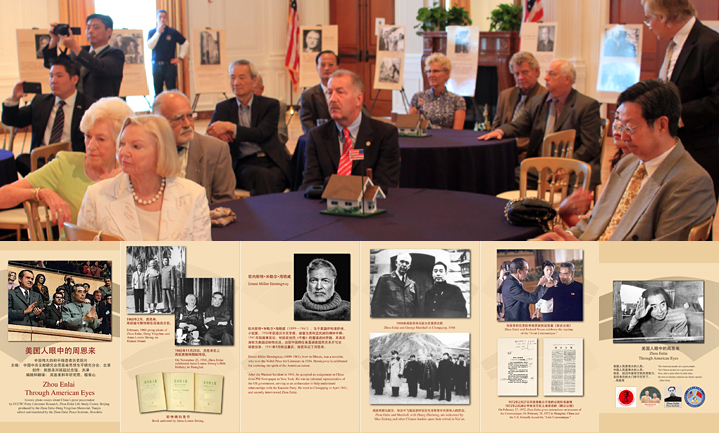
The exhibition, “Through American Eyes,” opens at the Nixon Library in Yorba Linda, California; August, 2014.
At the center of the China Hall in this library is a full-size bronze statue of Premier Zhou Enlai and President Nixon shaking hands, 42 years ago — a handshake of peace witnessed by the whole world.
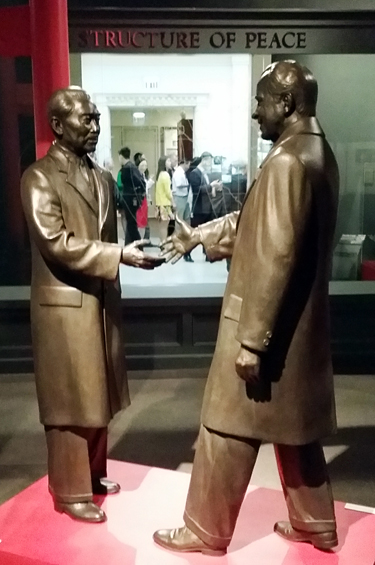
Life-size bronze figures of Zhou Enlai and President Nixon shake hands at the center of the Nixon Library in California.
The Institute will publish a bilingual picture book about all these activities. I will tell you a couple of related stories.
After the exhibition, we witnessed twenty pure white doves, released one by one, flying into the blue California sky. The first dove of peace was released by Mme. Liao, and the next was released by the wife of the son of President Roosevelt.

Liao Xinwen, leader of China’s delegation to the 35th Anniversary of Diplomatic Relations, releases a white dove of peace outside the Nixon Library. She is followed immediately by Mary Roosevelt, the wife of the eldest son of President Roosevelt.
The second example, in November 2013: at the CCCPC auditorium in Beijing, home of the National People’s Congress, the Zhou Enlai Peace Institute hosted a celebration of the 60th Anniversary of the Five Principles of Peace, first written by Premier Zhou Enlai. Many historic events have been held in this special place.
We invited representatives of countries that endorsed the Five Principles, and they sent high-level diplomatic representatives, including Ghana, Turkey and Indonesia. A diplomat from each nation shared touching memories of the Premier. The Institute created a short documentary to explain the significance of the Five Principles, which was played for the first time at this event.

Zhou Bingde, the niece of Zhou Enlai and Chair of the Zhou Enlai Peace Institute, speaks to a state banquet at the National People’s Congress.

The Ambassador from Ghana, a diplomat from Turkey, a diplomat from Indonesia (who introduced traditional dancers) all attended the 60th Anniversary of the Five Principles of Peace, National People’s Congress, November 2013.
It is important to understand history. This is a challenge for today’s young people, because you were born in a new era, a new world full of opportunities and possibilities. So events that took place 40 or 50 years ago may not seem important to you.
I understand; I felt that way when I was younger. If we only studied history, then we would continue make the same mistakes. But now I understand that the study of history is important — to learn the about the great accomplishments, to understand the heroes and their stories. This will inspire the next generation to choose the right path, and to continue on — to complete what their predecessors did not complete, in the cause of peace. The responsibility of young people is fresh innovation, based on the wisdom of the past.
Let us consider when Premier Zhou Enlai was 18 years old. When he was young, as with today’s young people, he had lofty ideals, and graduated among the highest academic achievers at Nankai Middle School, not far from here. He began his revolutionary road. His ideas about changing the world sparked into flame here, breaking the shackles of the old tradition, spanning history, unifying China, creating a new century.
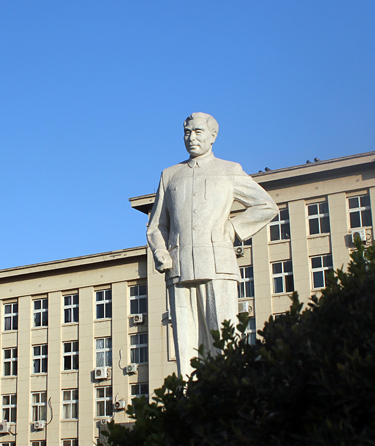
So when you see the statue of the Premier at the center of this campus, try to imagine that he was really here — the footsteps of history unfold before your eyes as if he still stands with us.
Because he does.
Who has visited Nankai Middle School? Where the seeds of revolution were planted?
I was honored to visit Nankai during a recent trip, to meet the International Department. In the school hallway, there is a mirror that Zhou Enlai passed each day. I stood with my brother in front of this mirror, and we saw the Premier looking back at us.
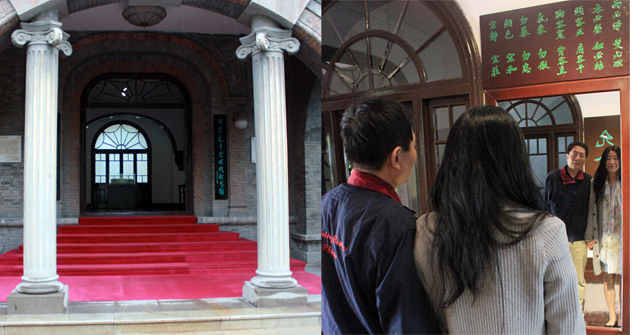
At the entry to Nankai Middle School in Tianjin, where Zhou Enlai attended high school.
You can also go and stand in that spot; in that mirror you will see the seeds of China’s renewal in 1916. The fire is still burning, and will connect with your fiery young heart, linked together.
Young Zhou Enlai’s first revolutionary idea was to be the first in learning, so he chose to go to Japan, the most powerful country in Asia at the time, with his Chinese friends and alumni. Before his departure, he wrote a poem:
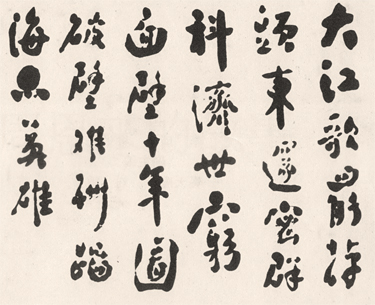
Having sung the song of the Majestic River,
I turn resolutely toward the East.
To immerse myself deeply into all disciplines of study,
In order to find ways to rescue the troubled world.
I don’t mind facing the wall for ten years,
Someday, I hope to break the wall.
Even if I fail, and end up throwing myself into the ocean,
It would still be heroic!
He sought to liberate the Chinese nation, and even more — he sought the liberation of all mankind, in his studies in Japan. His feelings are still with us, a harbor of noble ideals.
After seeing the bud of the revolution in Japan, and being part of the May Fourth Movement, he went to study in France, where he joined the Communist Party and officially began his revolutionary career.
Fifty years later, he received many friendly visitors from Japan, his old home. Imagine the situation at that time: China was still a developing country, the economy had just started to recover. Japan was developing very quickly, its people strong. The new China had not built up its status in the international community; many countries did not yet recognize it; China did not even have a seat in the United Nations.
At that time, Premier Zhou met with the great scholar and peace advocate, Mr. Daisaku Ikeda. His heart was still in pain, because of the campaign of the Japanese militarists against China, and the war between the two peoples was still fresh with the memory of enormous pain and suffering.
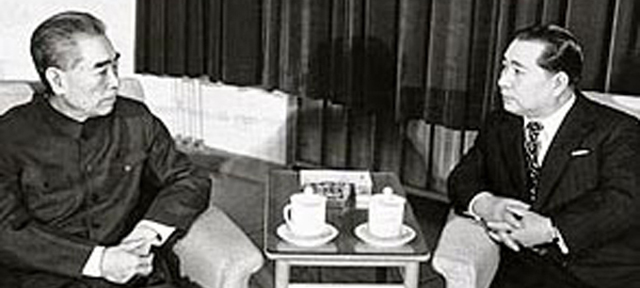
Premier Zhou Enlai meets with Japanese peacemaker, Dr. Daisaku Ikeda, in Beijing in 1974.
But Premier Zhou Enlai of China received Dr. Ikeda with dignity and compassion; their conversation is of historic significance and bore great fruit. It set the stage for breaking the deadlock with the US and China, through the visit of Mr. Kissinger and President Nixon to China, and signalled the beginning of a move toward the normalization of relations.
Now, let’s bring that past event into the present. We still member the brutality of the Japanese during the war, and the conflict over the Diaoyu Islands recalls this painful history. But the promise before the people now is one of unity, recognizing the common power in Asia.
Premier Zhou was fully aware of the history of the people and the tragic casualties, but he looked further, to this moment. Today we have the duty to understand and respect the past, and the vision of hope, formed just a few decades ago, which Dr. Ikeda and Premier Zhou saw.
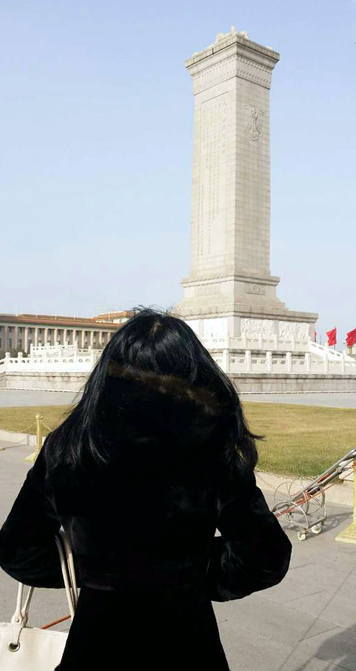
The Heroes Memorial in Tienanmen Square. At the top are the words of Zhou Enlai.
We can feel it — the Premier must live in our hearts. I believe I can feel it, because I saw his shadow in your eyes. Can Mr. Daisaku Ikeda and the people of Japan also feel that heart, the spirit of inspiration? I believe they can, because his spirit is the common aspiration of the people.
The world will then be inspired again by the Premier and by Mr. Ikeda. We cannot change or repeat the past, but we can inherit their cause of peace, and receive their great spirit. We can pass it through our children to future generations.
So, let’s focus our lives, to welcome these obligations that are due to us. Let us see the light of youth, to find unity for China, Japan, and the entire world.
I dedicate my life is to this simple human desire for peace, and invite you to join me in lighting the beacon of peace in our time.
Thank you!
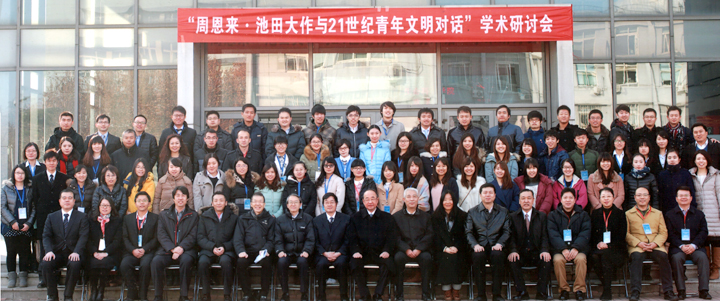
The class and faculty of the World Youth Symposium, Nankai University, Tianjin; December 2014.


